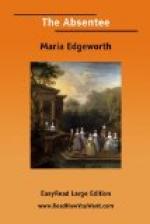’I thank you for making me smile, for I assure you I want it. I wish—if you would not think me encroaching upon your politeness and kindness in honouring me with this visit—You see,’ continued he, opening the doors of the back drawing-room, and pointing to large packages—’you see we are all preparing for a march; my mother has left town half an hour ago—my father engaged to dine abroad—only I at home—and, in this state of confusion, could I even venture to ask Count O’Halloran to stay and dine with me, without being able to offer him Irish ortolans or Irish plums—in short, will you let me rob you of two or three hours of your time? I am anxious to have your opinion on a subject of some importance to me, and on one where you are peculiarly qualified to judge and decide for me.’
’My dear lord, frankly, I have nothing half so good or so agreeable to do with my time; command my hours. I have already told you how much it flatters me to be consulted by the most helpless clerk in office; how much more about the private concerns of an enlightened young—friend, will Lord Colambre permit me to say? I hope so; for though the length of our acquaintance might not justify the word, yet regard and intimacy are not always in proportion to the time people have known each other, but to their mutual perception of certain attaching qualities, a certain similarity and suitableness of character.’
The good count, seeing that Lord Colambre was in much distress of mind, did all he could to soothe him by kindness; far from making any difficulty about giving up a few hours of his time, he seemed to have no other object in London, and no purpose in life, but to attend to our hero. To put him at ease, and to give him time to recover and arrange his thoughts, the count talked of indifferent subjects.
‘I think I heard you mention the name of Sir James Brooke.’
’Yes, I expected to have seen him when the servant first mentioned a friend from Ireland; because Sir James had told me that, as soon as he could get leave of absence, he would come to England.’
’He is come; is now at his estate is Huntingdonshire; doing, what do you think? I will give you a leading hint; recollect the seal which the little De Cresey put into your hands the day you dined at Oranmore. Faithful to his motto, “Deeds not words,” he is this instant, I believe, at deeds, title-deeds; making out marriage settlements, getting ready to put his seal to the happy articles.’
‘Happy man! I give him joy,’ said Lord Colambre; ’happy man! going to be married to such a woman—daughter of such a mother.’
’Daughter of such a mother! That is indeed a great addition and a great security to his happiness,’ said the count. ’Such a family to marry into; good from generation to generation; illustrious by character as well as by genealogy; “all the sons brave, and all the daughters chaste."’—Lord Colambre with difficulty repressed his feelings.—’if I could choose, I would rather that a woman I loved were of such a family than that she had for her dower the mines of Peru.’




